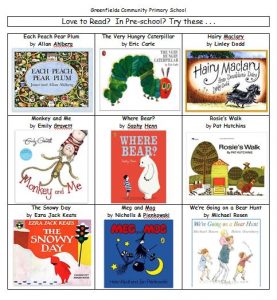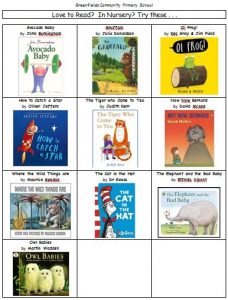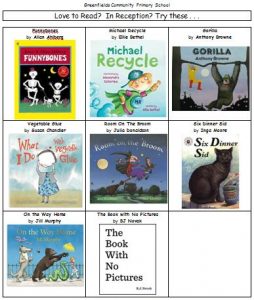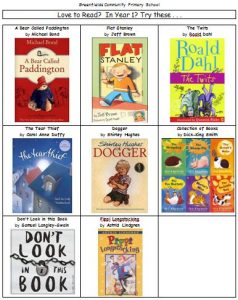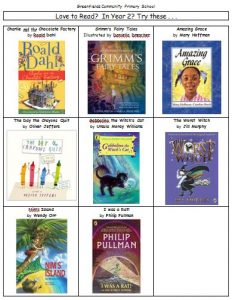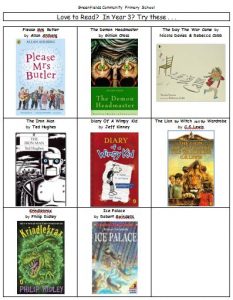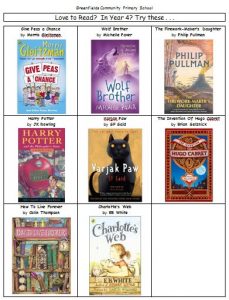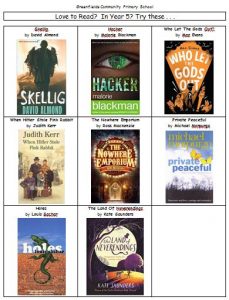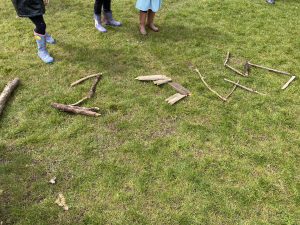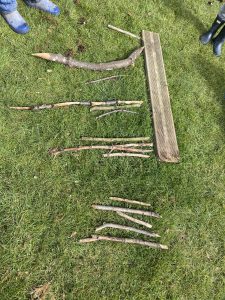This page shows who is leading each of the curriculum areas/subjects at Greenfields during 2024/25.
English
Leaders: Miss Evans
At Greenfields, we believe that learning to read is an essential part of every child’s education, because reading is the key to success. As well as teaching children how to read, we aim to foster a love of reading in our children through exposure to exciting, challenging and meaningful texts throughout the curriculum.
Learning to Read
At Greenfields, we teach the children to read through phonics. Simply put, this is the process by which speech is written. In Early Years and KS1, children have daily phonics sessions, using the Read, Write, Inc. programme. Read Write Inc. is rooted in children having lots of chances to overlearn; to hear and say the sounds they need to read and in turn overlearn what these sounds look like when they are written down. Children are assessed every 6-8 weeks and are taught in groups with children who know the same sounds as them fluently.
To support our teaching of phonics and the children’s overlearning of the sounds they need, we send home reading books for you to use at home. Books are changed once a week, with the children taking home at least 2 reading books.
Children take home a small ‘paper’ book which is mainly grey and white inside. This is for children to practise at home the sound that they are learning in their phonics lessons. These books are quite short and the words in them often rhyme. They give the children an opportunity to ‘overlearn’ the sound and there are some questions at the back of this book which parents can also look at with their children.
Children also take home a glossy ‘book bag book’. This is a story book that allows the children to practise the sound they are learning in a different context.
We ask parents and carers to spend 10 minutes after school reading both of these books with their children. The books are not designed to be overly challenging; they contain sounds we know the children have learnt and provide them with the opportunity to become fluent in reading those sounds.
You can also follow this link to find out more about Read, Write, Inc:
http://www.ruthmiskin.com/en/read-write-inc-programmes/phonics/
Reading to Learn
Reading and discussing stimulating fiction, non-fiction and poetry in class also develops children’s comprehension skills. Every day children throughout school receive explicit teaching of reading skills. Children need good linguistic knowledge (in particular of vocabulary and grammar) and a broad knowledge of the world. Throughout the curriculum we plan enriching learning experiences, in and out of class, to broaden the children’s knowledge of themselves and the world. In KS2, we have reading skills sessions which last 40-45 minutes, in addition to our English lessons. We ensure that the children read a range of fiction non-fiction and poetry in these sessions; texts are chosen to support learning in Science, Geography, History, RE and PSHE where appropriate. The sessions include varied opportunities to read, discuss and justify their thinking and are broadly arranged as follows:
Session 1 – activities that focus on the vocabulary needed to understand the text, such as using dictionaries and online information, matching images. We also focus on fluency in this session, modelling how to read aloud well, focussing on specific skills such as pace, volume, expression and self-correction. The children then have multiple opportunities to rehearse reading aloud short passages.
Session 2 – Close or Extended Reading
Session 3 – applying the knowledge of the text to a range of questions
Regular sessions are planned in for Reading for Pleasure, where children can choose whichever book they like to read and enjoy; these sessions can take place in our school library and children are encouraged to share books with each other and see reading as a sociable activity.
Reading for Pleasure
Books are at the heart of school life at Greenfields, and we want our children to discover their own genuine love of reading. In order to do this, we have in place a number of ways to show them that reading is, above all, fun!
- Class reader – this is a book that the children help to choose and is read aloud every day, for pure enjoyment.
- Inspirational and interactive book corners – each classroom has an inviting book corner with specially selected books for children to borrow. Each class has devised a way of recommending their own favourites to their friends, including teachers!
- Weekly reading recommendations – each week, in the school newsletter, a member of staff and a child or two get to tell us about their favourite book.
- Book Chat – talking about books is actively encouraged! We make time for informal conversations about books whether this is between staff and children, or among the children themselves. We think this is vitally important as it can lead children to discover new titles and authors they may never have met before in a relaxed way.
- World Book Day – always a date to look forward to; this is when we get to celebrate our favourite books and authors
- Offering a wide range of texts – we know that children, just like adults, all have different tastes when it comes to reading, so we try to offer a wide range such as graphic novels, non-fiction, poetry and weekly publication such as First News or The Junior
What can you do at home?
Research shows that a child who reads for pleasure every day greatly increases their life chances. Here are some ideas you can try at home:
- Make books part of the furniture at home – Always have books around do that you and your children are ready to read whenever there is a chance. It doesn’t have to break the bank to stock a bookshelf – there are plenty of second-hand shops where you can pick up lovely books for around 50p.
- Join your local library – Get your child a library card! And they often sell off old stock very cheaply too.
- What is your child interested in? – Help them find the right book – it doesn’t matter if it’s fiction, poetry, comic books or non-fiction.
- All reading is good – Don’t worry if your child only seems to like reading the newspaper; leaflets, cereal packets, instruction manuals, comics are all good practice. Reading is reading – it is all valuable!
- Get comfortable! – Snuggle up somewhere warm and cosy with your child, either in bed, on a beanbag or on the sofa. DO they have somewhere they can read comfortably on their own too?
- Ask questions – To keep them interested in the story, ask your child questions as you read such as, “What do you think will happen next?” or “Where did we get to last night? Can you remember what has happened already?”
- Read whenever you get the chance – Bring along a book or magazine for any time your child has to wait, such as at the dentist’s, or on the bus.
- Read again and again – Encourage your child to re-read favourite books and poems as many times as they fancy. This is a great way to build up fluency and confidence.
- Bedtime stories – Regularly read with your child or children at bedtime, no matter how old they are! It’s a great way to end the day and to spend valuable time with your child.
- Rhyme and repetition – Books are great for encouraging your child and children to join in and remember the words.
You can follow these links for information, hints and tips about reading with children, whatever their age:
http://www.booktrust.org.uk/books/children/have-some-fun/#/d/booktrust/have-some-fun/children/
http://www.booktrust.org.uk/books/children/have-some-fun/#/d/booktrust/have-some-fun/children
http://games.e4education.co.uk/groupone
If you would like any more information about reading, please contact school and we’ll be happy to help.
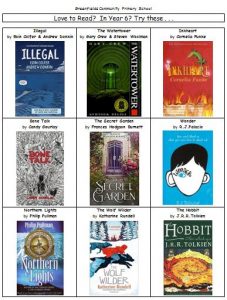
Maths
Leader: Mr Coverdale
In maths, we ensure that children are at the heart of our teaching and learning. We aim to make maths an inspiring, creative, rigorous, and practical subject. We want to ensure that every child has a depth of understanding and that processes are embedded so they can draw on this in everyday contexts. By breaking learning down into small steps, we aim to ensure that every child gains a good understanding of mathematical concepts which they can then apply to different situations. At Greenfields, we follow the ‘teaching for mastery’ approach through NCETM which allows for consistency across the school. It is important that each year group progresses from the previous one and that teachers have a clear understanding of what has been taught before.
Twice a week, the children in KS1 and KS2, take part in a ‘number talk’ session. ‘Number talk’ is a strategy to build flexibility, accuracy and efficiency in mathematical thinking through the discussion and sharing of mental maths strategies. It is a short daily routine that allows pupils to contribute to meaningful dialogue concentrating on how to answer mathematical calculations. ‘Number Talk’ is a powerful tool for helping students develop fluency when adding, subtracting, multiplying and dividing.
In maths, we revisit the same concepts each term allowing children the opportunity to build on previous knowledge and begin to master the acquired skills in different contexts. Through continuous assessment for learning, teachers ensure that children progress quickly at pace, address misconceptions and are challenged to grapple with new contexts. Year on year, our children can build on their skills, develop resilience within their learning and have the confidence to start a new year with the knowledge they have already gained, ready for new challenges ahead.
The aim of our maths curriculum is to ensure that all pupils:
- Acquire the skills and knowledge to apply their mathematical skills in a number of different contexts
- Develop mastery in maths and apply skills to reasoning and problem solving
- Develop a number of mental strategies and apply this across the curriculum
- Regularly revisit areas of the maths curriculum in order to regularly recall previously learned knowledge
- understand the place of maths in everyday life
Science
Leader: Mrs Banks (*SLE) & Mrs Bridge
Science at Greenfields Community Primary is coordinated by Mrs Banks, who is a Specialist Leader of Education for Science and Mrs Bridge.
As recognition for the high quality Science work that goes on throughout the year groups, from our 2-year-old provision up to Year 6, our school has earned the Primary Science Quality Mark Award. We are extremely proud of this award. The Primary Science Quality Mark is a highly successful, unique award programme to develop and celebrate the profile of science teaching, learning and leadership in primary schools. Science subject leaders join a local PSQM hub and are supported by professional development to achieve the Primary Science Quality Mark for their schools. We are due to renew our PSQM status this year.
In Science, we aim to develop the children’s knowledge and understanding of the world around them. In accordance with the National Curriculum guidelines, the children in each phase have experience with topics drawn from Biology, Physics and Chemistry. They learn to question and discuss how science can be used to explain what is occurring, predict how things will happen and analyse the causes.
The children learn about the different types of scientific enquiry from Key Stage 1 and, by the time they get to Upper Key Stage 2, independently choose which enquiry type is best to answer scientific questions:
Types of scientific enquiry
- Comparative and fair testing.
- Research
- Observation over time
- Pattern-seeking
- Identifying, grouping and classifying
- Problem-solving

Outdoor Learning is a huge part of our Science curriculum and each year group has 5 weeks of Forest School sessions with our Forest School Practitioner Mrs Creedy.


In nursery & reception, the children follow the Early Years Foundation Stage curriculum and science is very much intertwined in everything they do. This includes technology, people and communities and Understanding the World. They explore science topics using their senses to develop their skills of observation, prediction and discussion. They make use of their environment, for example bringing some snow, leaves or soil into the class to investigate, explore and make predictions.

In Key Stage 1, the children use practical, hands-on experiences, books, photographs and videos to look closely at the natural and humanly-constructed world and are encouraged to be curious, ask questions, and build on the foundation laid down in Early Years. They begin to write at length about their investigations and predictions.

By using scientific processes – observing, problem-solving, pattern-seeking, predicting outcomes of experiments and communicating findings in a variety of ways – the children begin to develop their understanding of scientific ideas.
In Key Stage 2, the children broaden their scientific view of the world by exploring, talking about, developing and testing their ideas. They then use their evidence, scientific knowledge and understanding to justify and explain their findings using more complex scientific vocabulary. We believe that with the experience of scientific processes and a wide range of topics the children will be well equipped to meet the challenges of science work in their future school years and life beyond.


At Greenfields we like to make our learning fun and hands-on so we widen the children’s opportunities wherever possible. We enhance their learning by going on visits, inviting science experts in and becoming involved in many local and national initiatives. Each year we hold a Science Week where we explore current issues such as climate change, sea pollution, time and plastic litter in our oceans.

Art and Design
Leader: Mrs Cockman
At Greenfields we aim to provide a broad balanced and progressive Arts curriculum. The school’s aim is to enable each child to reach their full potential in Art, through investigating and making, research and the development of skills and through the evaluation of their own artwork and that made by others.
To achieve that aim the school plans a range of activities in art which provide opportunities for pupils to:
- Record responses to experience and imagination and to observations of the natural and made environment
- Gather resources and materials, using them to stimulate and develop ideas
- Explore and use two and three dimensional media, working on a variety of scales
- Review and modify their work as it progresses
- Develop understanding of the work of artists, craftspeople and designers from a range of times and cultures and apply this to their work
- Respond to and evaluate art, craft and design, including their own and the work of others.
Each year all of our children experience a wide range of arts and culture based activities both in and outside the classroom. This could be through reflection, visits and visiting artists. We have recently extended our reflection session where parents can visit the school and create crafts with the children. This gives the children the opportunity to explore a variety of materials and ways of joining them in different ways.
Educational visits are part of our curriculum from nursery onwards and these allow the children to consolidate learning and improve their knowledge, skills and understanding in art. Teaching through the Arts allows all children to experience success regardless of ability background or gender.
Visits to local theatres, galleries, museums etc. will involve the children in activities that will encourage children, staff and families to engage in the arts/culture opportunities on offer in the region. Visits to museums and places of interest have taken place emphasising the importance of providing stimulating, meaningful, hands-on cultural activities for everyone.
We have the Artsmark gold award which gives us the opportunity to share practices between like-minded schools within the region so that we can be inspired, learn from each other, further improve our practice and make a positive contribution to the Arts within all of the schools participating. By working alongside the partner schools and utilising the external expertise on offer form Culture Bridge North East, North Tyneside Learning Trust (music and art hub), local museums and galleries, other local arts and culture provider’s schools etc. we will all be able to make a positive impact on the already vibrant culture of the North East.
The Art and Design Programmes of Study can be found on this external link
Design Technology
Leaders: Miss Ware
At Greenfields, we ensure that children are at the heart of our teaching and learning in DT. We aim to make DT an inspiring, creative, and practical subject. In Early Years, KS1 and KS2 children learn a wide range of practical skills which they can use to develop their own products and designs. Our D.T. curriculum is broken down into 3 strands; Cooking and Nutrition, Mechanisms and Mechanical systems/structures and Textiles.
DT links are made to key topical issues and, where relevant, our History & Geography curriculum, to ensure the pupils design and make products that solve real and relevant problems. They draw on subject knowledge from STEAM subjects (Science, Technology, Engineering, Art and Maths). By making links to DT during STEAM and World of Work workshops, we aim to show the children the careers that could be open to them in the future with design & technology skills.
At Greenfields we like to make our learning fun and hands on so we widen the children’s opportunities wherever possible. D&T gives children the opportunity to develop skills, knowledge and understanding of designing and making functional products. At Greenfields we feel it is vital to nurture creativity and imagination through design, and by exploring the designed and made world in which we all live and work. We also encourage parent involvement and have had parents & carers into school to talk to children about their careers, making them aware of the wonder or the world of work and future
careers to think about.
DT lessons also help to educate the children in nutrition and the teaching of cooking skills and techniques. Not only that, but all children at Greenfields have the opportunity to cook outside during their Forest School sessions.
Geography
Leader: Mr Lumsdon
INTENT:
Our Geography curriculum is designed to:
Increase children’s knowledge and understanding of their own locality, the E.U. and contrasting localities in the wider world that will help them set local, national and international events within a global context.
Develop an awareness and understanding of features, physical processes and change in their immediate environment and other localities which they study.
Enable children to understand and compare the physical and human characteristics and processes e.g. weather, settlement, transport and employment in different localities.
Enable children to appreciate and compare the environment and to understand how and why people seek to manage and sustain environments and to identify ways in which damage can be repaired.
Develop the skills, knowledge and understanding necessary to identify and investigate important cultural, social and environmental issues with sensitivity to people’s attitudes and values.
Help children to develop an understanding of the nature of multi-cultural and multi-ethical societies and a sensitivity to cultural and racial prejudice and injustice.
Develop competency in using maps, atlases, photographs, fieldwork techniques and to develop skills appropriate to geographical enquiry e.g. the ability to observe, analyse and communicate, to gather and interpret information and use ICT to support their learning where appropriate.
IMPLEMENTATION:
The objectives of geography teaching in our school are based on the requirements of the National Curriculum programmes of study for EYFS, Key Stage 1 and Key Stage 2. We follow the aims of the Early Learning Goals for our EYFS curriculum and we have followed advice from the Geographical Association when creating our KS1 and KS2 curriculum. Each topic has been designed specifically to fit with our schools vision, values and local context.
In terms of our EYFS geography curriculum, we focus on the section of the ELG that is ‘Understanding the World,’ :

We use these objectives to inform the activities we deliver and offer to our EYFS children.
Our curriculum is split into key strands, based on the wording of the NC, that form the foundations of our planning:

You will find these in the planning documents, to demonstrate to teachers which subject specific skills are applicable for each lesson. You will also find them as a sticker at the beginning of each lesson, so that children can recognise which skills they are using and become more fluent in understanding each.
Pupils should develop knowledge about the world, the United Kingdom and their locality.
They should understand basic subject-specific vocabulary relating to human and physical geography and begin to use geographical skills, including first-hand observation, to enhance their locational awareness.
Pupils should be taught to:
Locational knowledge
~Name and locate the world’s seven continents and five oceans
~Name, locate and identify characteristics of the four countries and capital cities of the United Kingdom and its surrounding seas
Place knowledge
~Understand geographical similarities and differences through studying the human and physical geography of a small area of the United Kingdom, and of a small area in a contrasting non-European country
Human and physical geography
~Identify seasonal and daily weather patterns in the United Kingdom and the location of hot and cold areas of the world in relation to the Equator and the North and South Poles
~Use basic geographical vocabulary to refer to:
~Key physical features, including: beach, cliff, coast, forest, hill, mountain, sea, ocean, river, soil, valley, vegetation, season and weather
~Key human features, including: city, town, village, factory, farm, house, office, port, harbour and shop
Geographical skills and fieldwork
~Use world maps, atlases and globes to identify the United Kingdom and its countries, as well as the countries, continents and oceans studied at this key stage
~Use simple compass directions (North, South, East and West) and locational and directional language [for example, near and far; left and right], to describe the location of features and routes on a map
Based on the statutory requirements of the National Curriculum, our KS1 topics are:
Year 1
Autumn 2/Spring 1 – A local study of familiar environments
If you had the freedom to choose where you live; would you pick the city, the countryside or the beach?
Spring 2 – Geographical skills and fieldwork
Year 2
Autumn 2/Spring 1 – A comparative study of a country outside of Europe, compared with the UK.
What can we change to protect Australia?
Spring 2 – Geographical skills and fieldwork
In KS2, pupils should extend their knowledge and understanding beyond the local area to include the United Kingdom and Europe, North and South America. This will include the location and characteristics of a range of the world’s most significant human and physical features. They should develop their use of geographical knowledge, understanding and skills to enhance their locational and place knowledge.
Pupils should be taught to:
Locational knowledge
~Locate the world’s countries, using maps to focus on Europe (including the location of Russia) and North and South America, concentrating on their environmental regions, key physical and human characteristics, countries, and major cities
~Name and locate counties and cities of the United Kingdom, geographical regions and their identifying human and physical characteristics, key topographical features (including hills, mountains, coasts and rivers), and land-use patterns; and understand how some of these aspects have changed over time
~Identify the position and significance of latitude, longitude, Equator, Northern Hemisphere, Southern Hemisphere, the Tropics of Cancer and Capricorn, Arctic and Antarctic Circle, the Prime/Greenwich Meridian and time zones (including day and night)
Place knowledge
~Understand geographical similarities and differences through the study of human and physical geography of a region of the United Kingdom, a region in a European country, and a region within North or South America
Human and physical geography
~Describe and understand key aspects of:
~Physical geography, including: climate zones, biomes and vegetation belts, rivers, mountains, volcanoes and earthquakes, and the water cycle
~Human geography, including: types of settlement and land use, economic activity including trade links, and the distribution of natural resources including energy, food, minerals and water
Geographical skills and fieldwork
~Use maps, atlases, globes and digital/computer mapping to locate countries and describe features studied
~Use the eight points of a compass, four and six-figure grid references, symbols and key (including the use of Ordnance Survey maps) to build their knowledge of the United Kingdom and the wider world
~Use fieldwork to observe, measure, record and present the human and physical features in the local area using a range of methods, including sketch maps, plans and graphs, and digital technology.
Based on the statutory requirements of the National Curriculum, our KS2 topics are:
Year 3
Autumn 2/Spring 1 – A study of rivers and their benefits.
What kind of reforms could we make to live safely next to a river?
Spring 2 – Geographical skills and fieldwork
Year 4
Autumn 2/Spring 1 – A study of volcanoes and earthquakes.
Is there wisdom behind the decision to live next to a volcano?
Spring 2 – Geographical skills and fieldwork
Year 5
Autumn 2/Spring 1 – A study of the Amazon rainforest and the human impact.
Is it too late for humans to show morality towards the Amazon Rainforest?
Spring 2 – Geographical skills and fieldwork
Year 6
Autumn 2/Spring 1 – A comparative study of the UK, USA and China
What is the truth behind becoming a world superpower?
Spring 2 – Geographical skills and fieldwork
ASSESSMENT:
We assess the children’s work in geography through ongoing teacher assessment. This allows us to identify any pupils requiring support in specific lessons and those children who hold a deeper understanding so that we can adjust our lessons accordingly.
Once the children have completed a unit of work, we have created a summative assessment for each topic to gauge how much the children have retained. This consists of 6 questions that involve recalling key learning throughout the topic as well as a final interpretation question to offer an opportunity for pupils to demonstrate a greater depth of understanding.
For example;

To ensure that content is remembered long term and can support learning in new topics, we use curriculum revisit activities to ensure that learning is remembered and re-used. Especially when it comes to abstract themes across the geography curriculum.
For example:

MEETING THE NEEDS OF ALL LEARNERS:
We aim to encourage all children to reach their full potential through the provision of varied opportunities. All children should have equal access to the geography curriculum through appropriately selected activities. We recognise that our curriculum planning must allow children to gain a progressively deeper understanding and competency as they move through school. If we feel a pupil has a learning need or English acts as a barrier for them to make progress in geography, we give them the opportunity to verbalise their answer to a question and we record that via Seesaw, placing a QR code in their book. For example:

Where appropriate, we also utilise our membership to Mozaik3D. This allows us to bring abstract concepts and learning to life:
https://www.mozaweb.com/en/Extra-3D_scenes-Terms_of_physical_geography-139713


We have also incorporated the LYFTA platform into our weekly assemblies. This is an interactive resource which allows the children to visit different locations and countries around the world and find out about the lives of people that live and work there.
History
Leader: Mr Lumsdon (*SLE)
INTENT:
Our history curriculum will help pupils gain a coherent knowledge and understanding of Britain’s past and that of the wider world. It should inspire pupils’ curiosity to know more about the past. Teaching should equip pupils to ask perceptive questions, think critically, weigh evidence, sift arguments, and develop perspective and judgement. History helps pupils to understand the complexity of people’s lives, the process of change, the diversity of societies and relationships between different groups, as well as their own identity and the challenges of their time.
We aim to ensure that all pupils:
- Know and understand the history of these islands as a coherent, chronological narrative, from the earliest times to the present day: how people’s lives have shaped this nation and how Britain has influenced and been influenced by the wider world
- Know and understand significant aspects of the history of the wider world: the nature of ancient civilisations; the expansion and dissolution of empires; characteristic features of past non-European societies; achievements and follies of mankind
- Gain and deploy a historically grounded understanding of abstract terms such as ‘empire’, ‘civilisation’, ‘parliament’ and ‘peasantry’
- Understand historical concepts such as continuity and change, cause and consequence, similarity, difference and significance, and use them to make connections, draw contrasts, analyse trends, frame historically-valid questions and create their own structured accounts, including written narratives and analyses
- Understand the methods of historical enquiry, including how evidence is used rigorously to make historical claims, and discern how and why contrasting arguments and interpretations of the past have been constructed
- Gain historical perspective by placing their growing knowledge into different contexts, understanding the connections between local, regional, national and international history; between cultural, economic, military, political, religious and social history; and between short- and long-term timescales.
IMPLEMENTATION:
The objectives of history teaching in our school are based on the requirements of the National Curriculum programmes of study for EYFS, Key Stage 1 and Key Stage 2.
We follow the aims of the Early Learning Goals for our EYFS curriculum and we have followed advice from the Historical Association when creating our KS1 and KS2 curriculum.
Each topic has been designed specifically to fit with our schools vision, values and local context.
In terms of our EYFS history curriculum, we focus on the section of the ELG that is ‘Understanding the World,’ :
We use these objectives to inform the activities we deliver and offer to our EYFS children.
Our curriculum is split into key strands, based on the wording of the NC, that form the foundations of our planning:
Knowledge
Themes across history
Historical concepts
Historical enquiry
Chronological understanding
You will find these in the planning documents, to demonstrate to teachers which subject specific skills are applicable for each lesson. You will also find them as a sticker at the beginning of each lesson, so that children can recognise which skills they are using and become more fluent in understanding each.
In KS1, we aim to create a link between their EYFS learning as well as preparing them for more complex topics in KS2. We want the children to develop an awareness of the past, using common words and phrases relating to the passing of time. They should know where the people and events they study fit within a chronological framework and identify similarities and differences between ways of life in different periods. They should use a wide vocabulary of everyday historical terms. They should ask and answer questions, choosing and using parts of stories and other sources to show that they know and understand key features of events. They should understand some of the ways in which we find out about the past and identify different ways in which it is represented.
Based on the statutory requirements of the National Curriculum, our KS1 topics are:
Year 1
Autumn – A study of local changes in our village and environment
Should we fear changes to ourselves and in our local area?
Summer – A study of significant monarchs, past and present.
Is being a monarch a huge responsibility?
Year 2
Autumn – Remembrance and the significance of the poppy.
Is it important to remember the consequences of the past?
Summer – A comparative study of significant activities; Rosa Parks, Anthony Cooper and Malala Yousafzai.
Have humans always shown fairness to each other?
In KS2, we want pupils to continue to develop a chronologically secure knowledge and understanding of British, local and world history, establishing clear narratives within and across the periods they study. They should note connections, contrasts and trends over time and develop the appropriate use of historical terms. They should regularly address and sometimes devise historically valid questions about change, cause, similarity and difference, and significance. They should construct informed responses that involve thoughtful selection and organisation of relevant historical information. They should understand how our knowledge of the past is constructed from a range of sources.
Based on the statutory requirements of the National Curriculum, our KS2 topics are:
Year 3
Autumn – A significant turning point in British history; The Industrial Revolution
Was the industrial revolution in Britain a big mistake?
Summer – A comparative study of the Ancient Greek Empire and the Roman Empire
How has our society and way of life been influenced by others?
Year 4
Autumn – A study of Britain during the Stone, Bronze and Iron Age.
Is it difficult to empathise with prehistoric humans?
Summer – A study of the Viking and Saxon conflict in Britain
To which monarch of England do we owe our loyalty to?
Year 5
Autumn – A study of the Shang Dynasty
What did power look like in Ancient history and how would someone achieve it?
Summer – A study of the Kingdom of Benin and the impact of the British Empire
Has Africa always had the opportunity to grow and prosper?
Year 6
Autumn – A comparative study of different ancient civilisations.
Was ancient history a period of adversity compared to the modern world?
Summer – An in depth study of the British chronological framework up to 1066.
How has our society been influenced to become the Britain we know?
ASSESSMENT:
We assess the children’s work in History through ongoing teacher assessment. This allows us to identify any pupils requiring support in specific lessons and those children who hold a deeper understanding so that we can adjust our lessons accordingly.
Once the children have completed a unit of work, we have created a summative assessment for each topic to gauge how much the children have retained. This consists of 6 questions that involve recalling key learning throughout the topic as well as a final interpretation question to offer an opportunity for pupils to demonstrate a greater depth of understanding.
For example;

To ensure that content is remembered long term and can support learning in new topics, we use curriculum revisit activities to ensure that learning is remembered and re-used. Especially when it comes to abstract themes across the history curriculum.
For example:

MEETING THE NEEDS OF ALL LEARNERS:
We aim to encourage all children to reach their full potential through the provision of varied opportunities. All children should have equal access to the History curriculum through appropriately selected activities. We recognise that our curriculum planning must allow children to gain a progressively deeper understanding and competency as they move through school. If we feel a pupil has a learning need or English acts as a barrier for them to make progress in history, we give them the opportunity to verbalise their answer to a question and we record that via SeeSaw, placing a QR code in their book. For example:

We aim to make our curriculum as visual as possible, all of our resources in books will have visual prompts and we have made our approach to chronology more interactive and visual for the children too. We now build timelines with accurate scaling, so that children can continuously place their current learning amongst all of their prior learning.
See example;

Where appropriate, we also utilise our membership to Mozaik3D. This allows us to bring abstract concepts and learning to life:
https://www.mozaweb.com/lexikon.php?cmd=extra_full&extraid=262356

RE
Leader: Mrs Wilson
At Greenfields we have spent the last two years developing our RE curriculum to ensure that it is reflective of our local community. The ethos behind our curriculum is underpinned by developing citizens of the future. We want our children to understand how we behave and live our lives affects other people and the world we live in. This is why our behaviour and ways of living are important issues. Our behaviour is influenced by our attitudes. Our attitudes are influenced by our experiences and beliefs. RE is the opportunity to reflect on our experience of the world and the beliefs, values and attitudes that guide us through life.
We do this by exploring the beliefs, values, practices, and ways of living from the principal religions and different worldviews.
We all play a part in creating the world and society we live in. What we believe, whether religious or not, contributes significantly to this. RE helps pupils (and the school as a whole) to reflect on the ways in which beliefs influence how people live their lives. At Greenfields we have worked hard to develop links to different places of worship in our community. Religious education has a particularly significant contribution to make because it is about a person’s way of experiencing, responding to and understanding the world.
As part of our offer, we want every child to understand and accept and appreciate our diverse community. Visits to different places of worship take place in the Spring Term and link to the learning taking place in the classroom. We aim to provide first hand experiences to bring learning to life.
Early Years and Year 1- Beginning at two years old our children visit St Columba’s church in Wideopen and take part in Messy Play activities throughout the year. This continues as our children transition to Nursery and ensures that the children of Greenfields know where their local church is and know that they are always welcome there. In Reception our children return to the church to begin learning about Christian values and features of the church. This learning is further developed in Year 1 as the children name and recognise the purpose of things we see in the Church. The children also learn about Baptism and recreate a Christening taking on different roles in church around the font.
As our children develop their knowledge about different religions they attend visits to the following places of worship within our local community;
Years 2 and 5 – Central Mosque in Newcastle
Year 3- Synagogue, Newcastle Reform
Year 4- Compassion Kadampa Buddhist Centre
Year 6- Gurdwara Sri Guru Singh Sabha
Pupil voice at Greenfields tells us that our children enjoy learning in RE. The teaching of RE is both creative and varied. Approaches include food tasting, drama, visits, art, music, re-telling important stories and reflecting on what learning means to them.

Central Mosque, Newcastle

St Columbas Church, Wideopen
As part of developing local links we also work closely with our local Reverend who comes along to our assemblies and shares in our learning.

S.T.E.A.M.
Leader: Mrs Banks
S.T.E.M. refers to Science, Technology, Engineering and Mathematics.
However at Greenfields we have S.T.E.A.M.! Yes, ART is also part of our S.T.E.M. curriculum. Art skills are often an integral and valuable part in design projects. This became very apparent in our participation in the ‘If you were an engineer, what would you do? Leaders Award, last year. Children from Reception, and years 1 to 4 entered this national competition to design and invent a product. Three of our pupils got through to the North East finals and their work was displayed at the Discovery Museum. All the children used their art skills to explain and display their engineering product designs. Following this success, children will be entering this years competition as well as the ‘Billion Ideas’ competition. Again, pupils from year 4 represented Greenfields at the regional final last year.
By inspiring and motivating our children, our aim is to ensure that all children see the values and opportunities these subjects offer. Through our creative enquiry based curriculum we teach the S.T.E.A.M. knowledge and skills that they will need, to take an active role in our increasingly scientific, and technological society.
Where possible, we also reach outside the classroom to enhance and enrich the school curriculum by making links with the world of work, so that children can relate school S.T.E.A.M. subjects to real world experiences. Through taking part in lessons, workshops, demonstrations and activities linked to businesses and industry, children at Greenfields can gain insights into the various job roles open to them and get excited about the new directions their studies could take them in. We have recently committed to working alongside the Education Business Partnership Service so that the children from year 2 to year 6 participate in activities that introduce the children to the world of work. S.T.E.M. ambassadors from many professional careers come and work alongside the children to encourage them to work in teams to take on work roles to produce an end project. Other S.T.E.A.M. projects include our participation in the national Polli:nation scheme. We are currently working on maintaining and improving our pollination areas within school . All year groups have been allocated spaces to maintain and use for S.T.E.A.M. projects and outdoor learning.
Links have been made with North Gosforth academy with Year 5 children attending a S.T.E.M. day and participating in computing, science and maths activities including programming Micro-bots!
Greenfields University courses that have run include Coding club, Programming, Engineering for KS1, Young inventors, Creative Engineering, Gardening Club, Young Botanists plus many more.
All the above projects have already provided our children with valuable experiences that we hope will encourage our children to raise their aspirations, spark their interest in the S.T.E.M. subjects and help them prepare for the demands of the 21st century workplace. Watch this space as we continue to S.T.E.A.M. ahead!
Computing
Leader: Mr Coverdale
The new National Curriculum has introduced a new subject in the form of “Computing” which now replaces the subject “ICT” (Information Communication Technology)
The use of computers, tablets, programmable robots, digital and video cameras is an integral part of the National Curriculum and is a key skill for everyday life that can be used to acquire, organise, store, manipulate, interpret, communicate and present information.
There is a focus on computational thinking and creativity, as well as opportunities for creative work in programming and digital media through three aspects of the computing curriculum:
Computer science (CS): Understanding algorithms, creating and debugging computer programs, using logical thinking and understanding how computer networks (including the Internet) work.
Information technology (IT): Using technology purposefully to create, organise, store, manipulate and retrieve digital content.
Digital literacy (DL): Using technology safely, respectfully and responsibly. The use of networks and The Internet to provide opportunities to collaborate and communicate.
At Greenfields Community Primary School we recognise that pupils are entitled to quality hardware and software and a structured and progressive approach to the learning of the skills needed to enable them to use it effectively. We provide each class with a suite of tablet laptops to ensure that Computing is taught as an integral part of the curriculum, both alongside and within our Enquiry based curriculum.
The Computing National Curriculum Programmes of Study can be found at this external link
Foreign Languages – French
Leader: Miss Love
Learning a foreign language can broaden horizons and provide an opening to other cultures. We want to foster children’s’ curiosity and deepen their understanding of the world. Through language learning, we encourage children to explore and respect different beliefs and cultures and enjoy learning about the world around us.
The national curriculum for languages aims to ensure that by the end of Key Stage 2, all children:
- understand and respond to spoken and written language from a variety of authentic sources
- speak with increasing confidence, fluency and spontaneity, finding ways of communicating what they want to say, including through discussion and asking questions, and continually improving the accuracy of their pronunciation and intonation
- can write at varying length, for different purposes and audiences, using the variety of grammatical structures that they have learnt
- discover and develop an appreciation of a range of writing in the language studied.
Language learning at our school
At Greenfields, French is taught in all year groups from Year 1 to Year 6. Our focus is on practical communication. We follow the North Tyneside scheme of work, which has a balance of spoken and written language, to ensure a progressive and balanced curriculum throughout school. When learning French, we use a range of social skills and participate and cooperate with our peers through speaking, listening, reading and writing.
Each KS2 year group covers two units of work per year following the LanguageNut scheme:
Alongside these units we integrate languages into the everyday curriculum, for example:
- Signs around school are written in both English and French, so that children are introduced to new vocabulary which is meaningful
- Classroom commands are often given in French
- Registers are often taken in different languages
- PE warm ups are sometimes given using French vocabulary e.g. repeat/jump
European day of languages
Every year, we celebrate European Day of Languages by having our own ‘European day’.
Each year group looks at the importance of learning a new language and the opportunities it can lead to in the future.
The children learn about a range of things about different countries, such as the country’s main land features, key cities and towns, famous landmarks, food specialties, famous people and key events in the country’s history. The day is always full of research and practical activities like artwork and food tasting – we always thoroughly enjoy it!
Music
Leader: Mrs Wilson
At Greenfields we provide a broad, balanced and progressive music curriculum which is taught as a discrete subject linking to our school values- be brave and be bold. We aim for our music provision to be embedded and exceed the national curriculum and to support our pupils to realise their music potential.
The primary music national curriculum for KS1 and KS2 covers the following:
- Singing
- Playing tuned and untuned instruments
- Listening to recorded and live music
- Composing and improvising
- Understanding music history
- Understanding notation
It tells us teaching music in primary school requires facilitating children to “perform, listen to, review and evaluate music across a range of historical periods, musical genres, styles and traditions, including the works of the great composers and musicians”. However, at Greenfields we want it to be more than this. We want to create future musicians, empower our children to understand and talk about music and teach all children to learn how to play an instrument, understand and read notation and compose their own music before they leave primary school. We recognise that our children are the future of music and teach in innovative ways to capture their interests and recognise their potential in becoming a musician, including the use of music technology.
High quality school music education consists of three distinct, but interlinked areas of provision;

As soon as our children start with us at Greenfields, Music is high on our agenda. We strive to deliver high-quality music provision for all pupils in the three areas of curriculum, co-curricular and enrichment, and against the following key features:
- Timetable discrete curriculum music sessions
- Clear, music progression through our carefully planned out music curriculum starting in our Early Years
- Access to lessons across a range of instruments
- A school choir with opportunities to perform outside of school hours
- A school band
- Our fully equip music room
- Termly school performances
- Opportunities for our children to enjoy live music
Singing really is an integral part of our school day. Each week we gather as a whole school for a singing assembly with songs which match the season or theme we are learning about. The children learn alongside each other and perform at half termly assemblies. In the Autumn term the children have three four opportunities to perform including; harvest festival, remembrance day service, carol singing in our local church and Christmas performances.
We work closely with a North Tyneside Music Hub tutor who this year is developing our music offer by teaching after school ukulele club. Our Hub tutor also hosts ‘Band Club’ which is an after school opportunity for inspired musicians to come along and create something special. This offer is for children in Key Stage 1 and 2.
This year our Muddy Bairns (Early Years) are working with Ashleigh Lowes, a vocalist and community musician. We are taking part in an Early Years Music project, with North Tyneside Music Education Hub, and our 2-year old’s group. We believe that nurturing a love of music and music making in a child’s formative years will help to support their overall development and their musical development in the future, as well as positively impacting their wider mental and physical well-being, whilst having lots of fun. As part of the project, we like to involve our families, including inviting them along to our ‘Families Make Some Noise’ session. Our families can join us and make some music with your little ones, play some games, learn some new songs and sing some of the classics.
Your child may come home talking about their learning. Here are our musical terms and definitions;
Look at some of the opportunities our children have already had this year;
Songs around the campfire at Dukehouse Wood

Playing of the Bugle at the Remembrance Service

Seeing the Cold Stream Guards at Newcastle Cathedral

Each class performed a Harvest song at our Harvest Festival

In all of our Early Years Environments children have access to a range of instruments

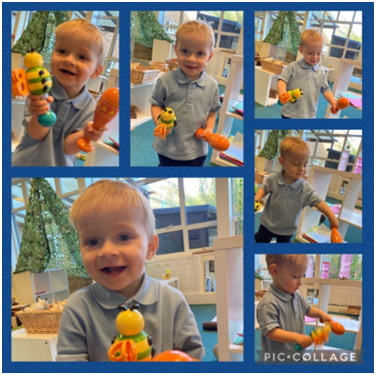
In Muddy Bairns our 2 year olds enjoy weekly Rhythm Time sessions and in Nursery our children work with Piccolo.

PE
Leader: Mrs Armer (*SLE) & Mrs Leslie
Greenfields is committed to providing outstanding PE provision, both as part of the school
curriculum, and through extra-curricular opportunities. We want to promote pupil health and
wellbeing, and to raise standards of attainment across the curriculum.
Curriculum
A wide range of activities are delivered in school which aim to engage and inspire all children. We aspire to provide at least 2 hours per week of high-quality planned PE. We have a PE curriculum that offers a broad range of sports; focusing on a challenge and developing skills, fitness at an individual level, raising aspirations, sportsmanship and increasing the health and life long sporting passion for all. The school’s PE provision is based on both the new National Curriculum and on the key findings of the Ofsted publication ‘Outstanding physical education for all’.
At Greenfields we offer a high-quality curriculum which is inclusive and is designed to meet the needs of all pupils. We try to cater for all our children’s needs and to ask the children which clubs they would like to see at Greenfields, this is done by Pupil Voice through the School Council. We track all our children’s participation in school clubs and sporting events in order to monitor participation and help to ensure we can provide something for all.
Over the year, each child will participate in games, athletics, dance and gymnastics lessons with swimming for KS2.
Adventurous activities are offered to children in Years 5 and 6 and include climbing, canoeing, problem solving, orienteering and archery which are delivered while they attend annual residential trips.
Events
PE and sport has a high profile in our school and permeates many aspects of school life. In the Summer term we hold our annual Sports Day in which we encourage participation of all children and organise competitive races which also include a parent’s event. We have Sports fundraising and charity events such as taking part in Sports Relief and the Cancer Run.
Clubs
We wish to complement the PE curriculum with a wide range of alternative as well as traditional sports through our extra-curricular sporting activities. We hope to capture pupils’ interest and enthusiasm and nurture a lifelong commitment to participation in sports and physical activity. We use outside coaches to enhance the variety of activities we can offer. This year we have a gymnastics coach delivering our gymnastics lessons which is also providing valuable training for our school staff. We also have Mrs Martinonge teaching our dance sessions to further upskill our teachers. Mrs Armer runs Netball, Mrs Foster delivers the Hockey club, Mr Watson and Mr Lumsdon are continuing with their Football club and Mrs Robertson and Miss Watton are running a hugely popular Skating club.
Every year children who did not achieve their 25m badge in Year 4 are given the opportunity to attend swimming booster sessions. We use some of the sport premium money in this way to offer another chance for children to reach the required standard in swimming by the time they leave our school.
Last year we were lucky enough to have a full day of coaching sessions going on in school with the Newcastle Falcons working with children from Year 1 up to Year 6.
Competition
We enter a wide range of competitions, particularly through our work towards achieving the School Games mark each year and have achieved the Gold award for the 2023/24 academic year.
Throughout the year we enter into, and practice, for a number of different competitions such as Y5/6 Hockey and Netball tournament, Athletics, and Gymnastics. We like to make sure we enter into a range of competitions that are offered to children across the school and for children of all abilities. A particular favourite is the North Tyneside Dance festival every year that takes place at the Whitley Bay Playhouse.
The children are always a credit to our school and demonstrate excellent sportsmanship, but it is also wonderful to celebrate their success.
PE and Sports Funding
The government is providing additional funding to improve the provision of physical education (PE) and sport in primary schools. This funding is ring-fenced and can therefore only be spent on the provision of PE and sport in schools.
At Greenfields we have used our PE funding in a variety of ways and split the funding into three key areas, Physical Education, Healthy Lifestyles and Competitive Sport.
The PE & Sports Funding document below gives full details about the impact of the way we spent the money last year and how we intend to spend the money this year:
PSHE and Citizenship
Leader: Mrs Cockman
What is PSHE? Personal, Social, Health and Economic (PSHE) education supports pupils to be safe, healthy and prepared for modern life. The PSHE education curriculum covers a range of key issues facing children and young people today, including those relating to relationships, mental and physical health, staying safe and aware online, financial literacy and careers.
PSHE at Greenfields – We are committed to investing in our pupil’s health and well being and by doing this we contribute to raising the pupil’s achievements. PSHE helps to give children the knowledge, skills and understanding that they need to stay healthy and safe, develop worthwhile relationships, respect differences, develop independence and responsibility, make the most of their own abilities and those of others. Therefore PSHE underpins our school ethos and reinforces our vision.
Pupils are encouraged to take part in a wide range of activities and experiences across and beyond the curriculum, contributing fully to the life of their school and communities. In doing so they learn to recognise their own self worth, work well with others and become increasingly responsible for their own learning. They reflect on their experiences and understand how they are developing personally and socially, tackling many of the spiritual, moral, social and cultural issues that are part of growing up.
We teach pupils how society is organised and governed. We also ensure that they experience the process of democracy in school through the School Council. Pupils learn to understand and respect our common humanity; diversity and differences so that they can go on to form the effective, fulfilling relationships that are an essential part of life and learning.

